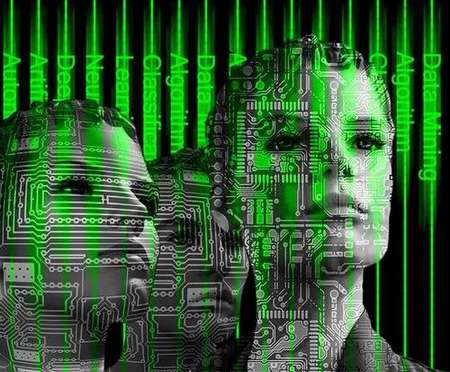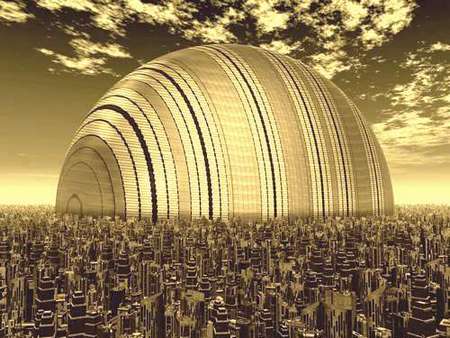
Does It Matter Whether Humankind Survives?
by Sylvia Engdahl
Most people would say that of course it matters. But there are others who don't think so. Is there any good reason to doubt it?
*
The strongest argument for space colonization is that it is necessary for the long-term survival of humankind. It has always seemed to me that the importance of our survival is obvious, and that the only possible way to contest the need for expanding our civilization into space is to claim that it is not necessary--that our species can survive forever on the one small planet with dwindling resources where we evolved. Since I don't believe that this is possible, or that it would result in a happy world if even if it were, it is hard for me to see why not everyone agrees that we must eventually settle other worlds.
Yet as I mentioned in my essay "Space Colonization, Faith, and Pascal's Wager," I have found that there are people who aren't bothered by the prospect of human extinction, and if they're not, no argument can convince them that it is to be avoided. It was surprising to me to learn this, and I first assumed that if the idea of our species becoming extinct didn't bother them, they just hadn't thought about it. However, discussing that essay online, one person declared that when as a child he heard about the extinction of the dinosaurs he thought that someday humankind too would be extinct and that this seemed entirely natural to him, and still did.,/p>

In which future generation would people stop feeling it matters whether their grandchildren survive?
I can see that a child might react that way, but I'm wondering whether this man had children or grandchildren of his own, and if so whether he cared about their survival. In the essay I put it this way: "One might ask what difference the time frame makes to people as long as the human race isn't wiped out while they're alive. If it's okay for us to become extinct, why not a mere hundred years from now? Most people, even those who don't care what happens in the distant future, feel strongly that it would be a bad thing for humankind not to outlast their grandchildren. Yet either the fate of our descendants matters, or it doesn't. If it doesn't, why not let our planet's environment deteriorate and save ourselves the trouble of trying to preserve it?"
That strikes me as a crucial question. A great many people, even those who don't worry about the long term, care very deeply about preserving the environment for the benefit of future generations. Where would they draw the line? To which future generation do they feel it would no longer matter, barring the idea that everyone might have migrated elsewhere? To the parents of which generation would it be unimportant for their children to survive?
There has, of course, been a great deal of apocalyptic science fiction about the human race being virtually wiped out by one disaster or another, as well as endless debate by futurists as to the likelihood of such scenarios. But this is hardly ever presented as a good thing or even a neutral one, There are usually at least a few survivors who make plans for the future, and in the few cases where there are not, such as in Nevil Shute's novel On the Beach, it is viewed as a tragedy.

If long-term survival of humankind doesn't matter, why bother to avoid nuclear war?
Almost everyone has a deep, instinctive feeling that our species will continue to exist when we ourselves are gone--and that however great the problems of our time, there will be some sort of future for those who come after us. In evolutionary terms, this is an adaptive trait. Without the urge for species survival no progress would ever have been made; our ancestors would not have bothered to achieve anything with a lasting impact on their offspring. Is it merely a biological urge that we have outgrown? If so, more than the desire to preserve Earth's environment is involved--unless long-term survival is a meaningful goal, there is no need to avoid nuclear war, either. Why not blow up the planet right now and be done with it?
This, of course, is a reductio ad absurdum. When it comes right down to it, no one (except doomsday cults and a few misanthropic fanatics who assert that the survival of animal species is more important than our own) would say it would be all right for humankind to die in the foreseeable future. And there is no logic in the idea that this feeling is going to change with the passage of years. People will always look ahead to what may happen to their own grandchildren and great-grandchildren.
To be sure, we do not know what cosmic meaning there is to an intelligent species' survival. But we don't know the meaning of our personal survival, either. Why should anybody be alive in the first place? We can't answer that. To some people, the meaning lies in the metaphorical concept of creation by God. To others, it's merely a matter of biological accident. And for still others, there is simply a conviction that there is a meaning beyond our present comprehension, that if there were no meaning to life it would be impossible to endure our existence. All these views apply to our species as well as to individuals--we cannot say that humankind needn't survive without implying that we ourselves might just as well be dead.
There is, in fact, a philosophy with roots in antiquity--now known as antinatalism--that asserts it would be better not to have been born and that procreation is therefore unethical. Since life involves suffering, why create more people who will suffer? This nihilistic view is one response to our inability to see the meaning in life (and/or the meaning in suffering), but to me it seems a typical case of denying the existence of something because one can't bear the uncertainty of not being able to grasp it. As I have pointed out in other contexts, comparatively few people are willing to accept permanent uncertainty about any topic.
The definition of "humankind" may vary. Some transhumanists believe that we will be so changed in the future that we can't be considered the same species. I see no sense in this; we may not be the same as today if physical changes are desired by the majority, but a difference so great as to rule out interbreeding seems unlikely, to say the least. (See my essay "The Future of Being Human.") In any case, it is merely a technicality; "posthumans" count as humankind as far as the desirability of long-term survival is concerned.

Would it matter if robots totally replaced humans?
However, another argument for questioning the significance of our species' survival is now sometimes expressed. There are quite a few futurists, including well-known scientists, who believe that robots may totally replace humans, and while many count this among potential disasters, others think it would be acceptable or even desirable. It is not just a matter of robots replacing most human workers, which will surely happen. Both doomsayers and advocates maintain that robots will become so superior to humans that they will be our successors after the human race is gone--an idea expressed in science fiction as far back as the nineteenth century. Perhaps they will even be morally superior, considering the evils perpetrated by humans in the past.
In the eyes of those who favor the demise of humanity in favor of robots, human distinctiveness is nothing more than our particular biological form. "From this point of view," writes Charles T Rubin in an article in The New Atlantis, "it becomes difficult to justify any grave concern if the workings of evolution do to us what they have done to so many other species; it becomes rank 'speciesism' to think that we deserve anything different. Yet the extinctionists are not content to show why, like everything else, human beings will be replaced or why the world might be better off without us. They aim to show why human beings should be replaced. If we are troubled by limits and imperfection, decay and death, we can imagine a world where intelligence has power enough to create something better."
The flaw in this idea, of course, is the notion that the human mind is nothing more than a brain and could thus exist in a machine. It is mere prejudice, advocates say, that makes us prefer flesh to silicon. But our material substance is not the thing at issue. If that were the only difference between humans and machines, our survival would indeed not matter, any more than it matters when other machines are destroyed. But human minds have attributes that machines do not, however intelligent those machines may become. We cannot yet define this essence in scientific terms, but we know it exists--it is what enables us to wonder, to create, and to love. (Not to mention being the source of psi capabilities, which any honest examination of human attributes must take into account.) It is this, not mere intelligence or even life as distinguished from inanimate matter, that makes survival of humankind important.

Does human survival matter if there are alien civilizations elsewhere in the universe?
There remains, however, one possible reason why the extinction of humankind might be said not to matter. What if species with equivalent minds exist on exoplanets? It's probable that they do, and unlikely that ours is the most advanced; some may already have died out due to disasters. Does the survival of any particular one make any difference to the universe as a whole?
Again, that's a question we cannot answer, as it depends on the unknowable meaning of existence. In science fiction it is common to ignore it and depict interstellar wars where the goal is to wipe out the aggressors, something I don't believe ever occur. (See my essay "Why There Will Never Be an Interplanetary War" in From This Green Earth.) In my own fiction I have assumed that each and every "human" race is considered important by the supercivilization that studies young ones and that the possible extinction of one is viewed a tragedy to be prevented at all costs. And this is consistent with the way we view individual lives--except where risk to life serves a purpose, we make every effort to save anyone who is endangered, even if that person is not contributing much to society. To apply different standards to whole species would not make sense.
So I personally have no doubt that the survival of humankind does matter, at least for as long as it's conceivably possible. According to Wikipedia, "Human extinction (together with extinction of all life) in the future by wholly natural causes is a certainty. The sun will eventually expand and engulf planet earth in roughly 7.5 billion years, and conditions to support life are estimated to last for [only] 1.5 billion years. Even if humanity would have achieved a technological level which would allow it to migrate to other planets when this happens, the universe will also invariably come to an end." I think we need not worry about this. If humankind hasn't colonized other solar systems long before 1.5 billion years have passed, it will surely have been destroyed by some event less drastic than expansion of the sun--or by resource depletion, which will happen much sooner. But supposing that we do spread throughout the galaxy--and maybe beyond--it will be enough to survive as long as the universe does.
Copyright 2020 by Sylvia Engdahl
All rights reserved.
This essay is included in my ebook The Future of Being Human and Other Essays